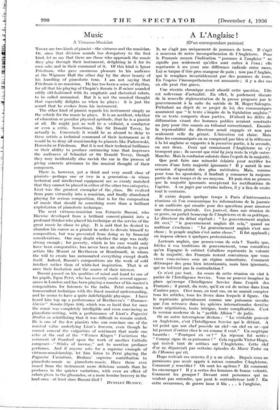Music
A Virtuoso-Musician
THERE are two kinds of pianist-the virtuoso and the musician. Or, since that division sounds too derogatory to the first
kind, let us say that there are those who approach the music they play through their instrument, delighting in it for its own sake and in their command of it. Of this kind is Ignaz Friedman, who gave enormous pleasure to his audience at the Wigmore Hall the other day by the sheer beauty of his handling of pianoforte tone. I am not saying that Friedman is no musician. He has too keen a sense of rhythm,
for all that his playing of Chopin's Sonata in B minor sounded oddly old-fashioned with its emphatic and rhetorical rubato, to be called unmusical. But it is not the musical thought that especially delights us when he plays ; it is just the sound that he evokes from his instrument.
The other kind of pianist regards his instrument simply as the vehicle for the music he plays. It is an accident, whether of education or peculiar physical aptitude, that he is a pianist at all. He might just as well be a violinist, a conductor or even a critic. Sometimes, like Sir Donald Tovey, he actually is. Conversely it would be as absurd to deny to
these artists a technical command of their instrument as it would be to deny all musicianship to pianists like Paderewski,
Horowitz or Friedman. But it is not their technical brilliance or their ability to produce entrancing tone that impresses the audiences of Sclumbel or Sir Donald Tovey, though they may incidentally also ravish the ear in the process of giving concrete utterance to the musical thought of their composers.
There is, however, yet a third and very small class of pianists—perhaps one or two in a generation—in whom technical and intellectual equipment are so evenly matched that they cannot be placed in either of the other two categories. Liszt was the greatest exemplar of the class. He evolved from pure virtuosity into a musician, and finally abandoned . playing for serious composition, that is for the composition of music that should be something more than a brilliant exploitation of pianoforte technique.
• The next virtuoso-musician was Feruccio Busoni, who likewise developed from a brilliant concert-pianist into a profound thinker who placed his technique at the service of the great music he chose to play. It is said that he desired to abandon his career as a pianist in order to devote himself to composition, but was prevented from doing so by financial considerations. One may doubt whether the urge was really strong enough ; for poverty, which in his case would only have been comparative, has never been an obstacle to great artists like Mozart or Beethoven or Rembrandt, in whom the will to create has surmounted everything except death itself. Indeed, Busoni's compositions are the work of cold intellect rather than of white-hot inspiration. That is at once their limitation and the source of their interest.
Busoni passed on his qualities of mind and hand to one of his pupils, Egon Petri, who has recently made several appear- ances in London and has been playing a number of his master's compositions for listeners to the radio. Petri combines a transcendent technique with the finest musical understanding, and he seems to have a quite indefatigable physique. I have
heard him top up a performance of Beethoven's " Hammer- /dozier" Sonata (Opus 106), which was so lucid that for once the music was completely intelligible and even convincing as pianoforte-writing, with a performance of Liszt's Paganini Studies so scintillating that it was difficult to remain seated.
He is one of the few pianists who can convince one of the Musical value underlying Liszt's bravura, even though he
cannot conceal the vulgarities of sentiment that made one
echo at the end of the " Weinen Klagen" Variations the comment of Stanford upon the work of another Catholic composer—" Stinks of incense," not to mention profaner perfumes. And if anyone asks for a supreme example of virtuoso-musicianship, let him listen to Petri playing the Paganini Variations, Braluns' aupreMe contribution to pianoforte-music as pianoforte-music. Have there ever issued from the instrument more delicious sounds than he produces in the quieter variations, with even an effect of ?Oat() given to the glissandos, or a more leonine bravery in the • loud ones—at ICast since Busoni died'?
DYNELEY HUSSEY.




















































 Previous page
Previous page